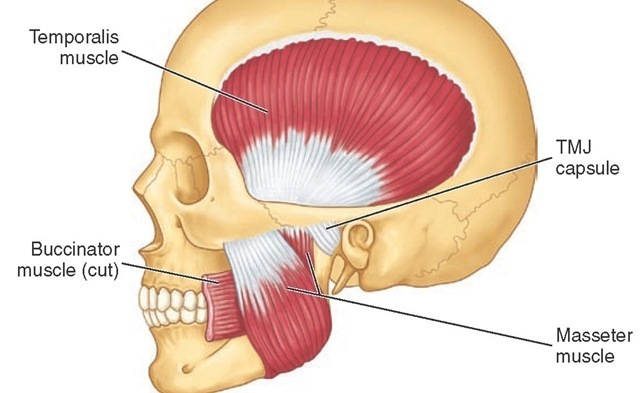Biting the Bullet: The Masseter

The masseter is one of the most crucial muscles in the human body because it allows us to chew food and thus nourish the body. Its name is derived from the Greek word masasthai, meaning “to chew”, and it forms a prominent part of the contours of the face. For its size, the masseter is one of our most powerful muscles, but it’s troublesome because of the effects of stress.
Structure and Functions
The masseter is a dense, basically rectangular muscle on either side of the face. It is easy to palpate: just lay your fingers on either side of your jaw and gently clench your teeth. The obvious bulge you feel is the masseter.
Anatomically, the masseter moves the temporomandibular joint (TMJ), working as a major agonist for elevation of the mandible (jawbone). Simply put, this means it helps close your mouth. Since the average person’s jaw opens and closes over 2000 times a day, this is a very active joint – especially for the talkative types!
Dysfunctions
If you’ve ever felt jaw fatigue after eating something chewy, you know a bit about masseter dysfunction. This muscle, and the TMJ generally, can get overworked or injured like any combination of joint and soft tissue. But the real trouble comes from the way we hold stress in the body in the form of muscle tension.
Clenching the jaw and baring the teeth is a natural, instinctive way that primates deal with stress and aggression. This is true for humans as well as our close relatives amongst the great apes. It gives us some useful protection if another primate hits us in the face, as the clenched jaw can reduce injury – boxers and combat athletes train this intentionally to help prevent being knocked out.
Our culture has some metaphors for dealing with pain, adversity, and tough times. “Bite the bullet” invokes a time before anesthetic, when injured soldiers would be told to bite down on something to endure the pain of surgery. “Grin and bear it” and “keep a stiff upper lip” are codes for controlling emotion in times of high stress.
All this reminds us that clenching the jaw can help us endure pain, stress, and emotional turmoil, but it comes with a price. The body doesn’t necessarily discriminate between the threat of injury and stress in general – as a result, many people develop the habit of clenching their jaw. Chronic stress often leads to chronic TMJ problems, and a tense, painful masseter muscle.
Pay attention to the way your jaw feels next time you are angry and suppressing the urge to “bite someone’s head off” – odds are your masseter will be tight.
Treatment
A tight masseter can contribute to a range of problems: headaches, facial pain, and damage to the teeth from bruxism (grinding the teeth) are common. Fortunately, massage can help! As always, it’s a good idea to first consult with your doctor or dentist if you suspect a serious problem. A professional massage therapist who knows facial anatomy can help relax this muscle, although advanced training is needed for dealing with more serious cases of TMJ dysfunction.
Other things can help as well: hot compresses, avoiding tough, chewy foods, and various stress-reduction techniques, from aromatherapy with essential oils like lavender to body-mind modalities like meditation.
Life may occasionally demand that we “bite the bullet”, but that doesn’t mean we have to patiently accept chronic pain. Speak your mind, breathe easy, and smile gently – and don’t forget to get a massage when your stress level is high!